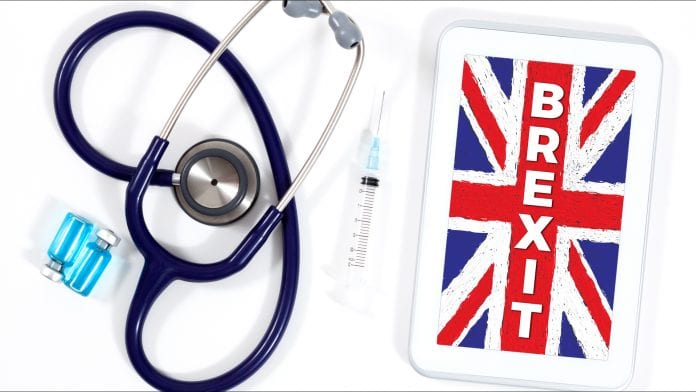
The media has been bombarded by the polarising Brexit ‘debate’, but the reality is that Brexit is happening with or without your support, and it’s happening soon.
Many industry experts from a variety of sectors have voiced their concerns on Brexit’s potential impact, but the one sector that is assured to suffer is healthcare. The sector, which provides security to every citizen, British or not, is undergoing preparation for the worst-case scenario. Will this be enough for a no-deal Brexit?
Nicholas Marin of Immigration Advice Service, UK, explores Brexit and the UK’s imminent departure from the European Union, discussing concerns that have been raised over what that may mean for a no-deal scenario.
The NHS and Brexit
The NHS is currently in a crippled state with well-known issues of staff numbers and funding being put to the side. The UK has managed through this hardship with the help of a migrant workforce that has been treated with growing hostility in the form of immigration policy.
This hostile environment policy, now coined as the complicit environment policy, has constantly refused to back down. This migrant workforce lifeline will be stripped away with the prospects of a no deal Brexit, one where the UK will demand more for substantially less.
The British Medical Association has released research stating that 45% of the doctors in the UK are considering leaving due to Brexit. There are around 12,000 doctors currently working and, as many know, this isn’t enough. The government has attempted to appeal to concerns by providing plans that are tailored for EU migrants currently residing in the UK.
What do you know about the EU Settlement Scheme?
The ‘EU Settlement Scheme’ is the governments solution, allowing EU citizens to maintain their rights and residence till 31 December 2020. In this time residents who have lived in the UK for five years or more will be able to apply for ‘settled’ status, ensuring that their rights are maintained indefinitely. This is a commendable approach, but the ongoing actions of the Home Office have still maintained their hostile agenda.
Employers in the health sector are concerned about their ability to maintain their operational capacity, especially when the Home Office has offered very few options for EU nationals to continue working in the UK. Employers are now looking to invest in a Sponsor Licence application. This is one of the only approaches available to employers that assures that their employees can maintain their current rights.
The validity of this solution as well as the EU settlement scheme is also a prospect of a post-Brexit world which has yet to be set in stone. The looming ‘no-deal’ scenario’ is an option that’s becoming more likely the closer we approach the Brexit deadline.
Precarious uncertainties
The no-deal is a worst-case scenario. Experts in the healthcare industry have highlighted the uncertainty it creates for not just EU citizens but British citizens as well. The consequences of a no deal present a stark reality that can no longer be ignored. The workforce issues will be made worse, affecting the capacity of hospital wards and doctor surgeries throughout all of the UK. The quality of care and standards of available resources will be lowered, this is not a choice of the NHS, it is a necessity to ensure that care can still be accessible.
The impact on our workforce does not stop there. The Home Office has announced the introduction of more expensive Immigration Health Surcharge fees, a cost that will double in price for any and all migrants applying for entry into the UK. This charge provides migrants with the same medical coverage that is offered to British Citizens throughout the length of their stay.
But in a future where our health sector’s quality is being forced to stagger and drop to levels never seen before, how can we justify this cost? For example, the charge for migrants on a Tier 2 Work Visa will be increased from £1,000 (~€1,000) to £2,000.
This is a desperate attempt to make the victims of our immigration policy pay for the gaps that the policy had imposed upon itself. The UK government has announced that this new surcharge will introduce an addition of £220m to NHS funding, will this be enough?
Insufficient funding
The new source of funding is not enough. It will not be enough for the British citizens and it won’t be enough for our migrant workers, the UK as a whole will be at a loss
Between 2007, and 2017, the UK received £1.2bn in EU funding, this will be lost forever no matter what deal we leave with. The claims that the fund will improve the NHS situation is a lie, they will simply act as a band-aid for the cuts the NHS are planned to have to their most crucial sources of funding.
Even if this wasn’t the case, the doctors, nurses, paramedics and the wide range of medical staff that are missing in our current talent pool will see no investment from an increased fund. Migrant workers will have to bear the brunt of this, they are left to face new and expensive routes, an increased health surcharge and an immigration policy that remains as adverse as possible. The UK seems to be determined to become as unappealing as possible to any and all prospective workers. Over 139,000 of the 1.2 million NHS staff members are non-UK nationals, yet we offer them no reason to continue to work in the UK.
We are deliberately assuring that our workers receive the worst-case scenario no matter which Brexit deal we leave with. When the new phase of the UK begins, we won’t be able to blame the EU or our migrant workers. At the end of the day, this was the choice of the people, all we can do now is wait.
The Immigration Advice Service is an organisation of UK immigration lawyers.
Nicholas Marin
Specialist Content Writer
Immigration Advice Service
Tweet @IASimmigration

























